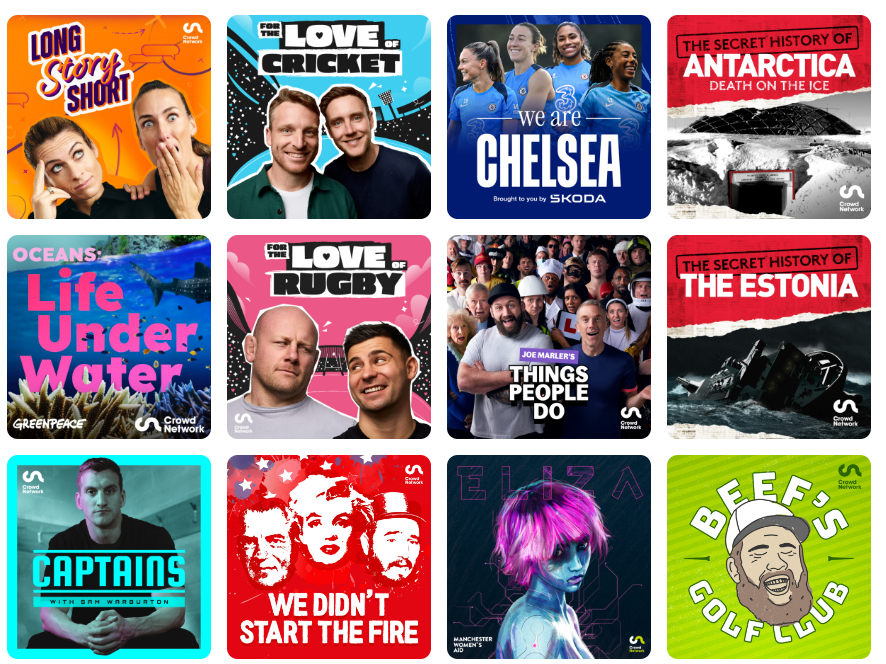
“We don’t really call them podcasts any more,” says Mike Carr, CEO of one of Europe’s fastest-growing podcast networks.
Carr co-founded Crowd in Manchester in 2020 along with three other ex-BBC Sports journalists, and the company is now behind some of Britain’s top sports podcasts, including For The Love Of Rugby with Dan Cole and Ben Youngs and Joe Marler’s Things People Do.
It has produced more than 20 podcast strands and two shows (For the Love of Rugby and For the Love of Cricket) each claim a million listens per month. The company is said to have doubled its revenue every year since 2020.
But the podcast market has changed rapidly since 2020, says Carr, and today it’s crucial to meet customers where they are, which often means YouTube.
He said: “Five years ago, when we launched, it was all about audio. If you think about the podcast industry at the start of 2020, it was all about Spotify, chucking millions of pounds at companies that had loads of podcasts, and then that quickly disappeared.
“At that time, we were a podcast network. Social media was kind of used as an aside to promote our shows and drive them to the audio RSS feeds.
“That has absolutely turned on its head now: podcasts are shows. We don’t really call them podcasts: they are shows. They are audio shows and video shows on YouTube. Our teams are built around all video producers and social media producers.”
The company is on track for three million listens and 100 million social views in July.
Carr said that today, Crowd Network’s brand partnerships with organisations such as Red Bull are heavily centred on social and video, making YouTube even more important – with the company now launching podcasts simultaneously as audio and YouTube.
The company is currently said to be seeing 80% year-on-year revenue growth, driven by brand partnerships and advertising.
The company’s business model sees it launch “joint ventures” with each of its stars, many of whom are keen to forge careers that will endure after their sporting careers end. This also mirrors the approach of Goalhanger which offers its hosts a lucrative revenue split on advertising.
Carr said: “We think the most effective way of doing it is to give them some ownership of the project. That is a very important strategy in what we do. That basically creates a business with each of our athletes that we work with. They provide being themselves, basically, and clearly we know the industry and we know the content side of things. Decisions are made together.
“It’s an exciting proposal for certain athletes who don’t just want to be paid and do a project, they want something that they can grow, something they can make decisions around.
Crowd has also worked with brands such as Greenpeace on two series of Oceans: Life Under Water, but sport remains the focus.
Carr said: “[Cricketer] Jos Butler has 3.5 million on Instagram. He’s absolutely massive in India, and you have to effectively use those channels.”
Carr said: “When you bring someone into a joint venture, you’re basically inviting them into your life. Your work life, your personal life, everything. So you have to really get to understand them before anything is signed.
“Sports people in the main are, you know, competitive beasts, and they do need management, however nice they are, they need to see improvement in themselves. They need to see improvement in the vision and the growth of the podcast. You know, they’re not going to settle for, ‘Yeah, that was all right’.”
Crowded content Director Steve Jones said both YouTube and Spotify are now starting to “reward” good content by making it more discoverable, which means it is easier to find an audience.
He said: “I think you could have made the best content anyone’s ever heard in the podcast industry five years ago, and there’s a good chance it wouldn’t have been discovered.
“If the content is good enough, there is now a way of getting it out there. You’ve got to be consistent, and you’ve got to get any workflow right. I think more so than ever, if an athlete has a good idea and makes good content, they will find an audience. That’s quite nice, because it’s definitely not always been the case.”
Jones says that a survey of 4,000 users found that the ways Crowd Network’s podcasts are discovered are very varied: with 14% arriving via Facebook, 20% via Instagram and a quarter via either Spotify or YouTube.
“None of them dominate,” said Jones.
Jones, who described the shows as “startups with athletes”, said: “The shift is each individual show has multiple revenue streams coming off it. Would I rather have ten shows or five shows: I’d rather have five valuable properties that can all sell live shows, go on tour, have merchandise, do big branded partnerships, as well as be a weekly thing that people enjoy listening and watching.”
Email pged@pressgazette.co.uk to point out mistakes, provide story tips or send in a letter for publication on our "Letters Page" blog
